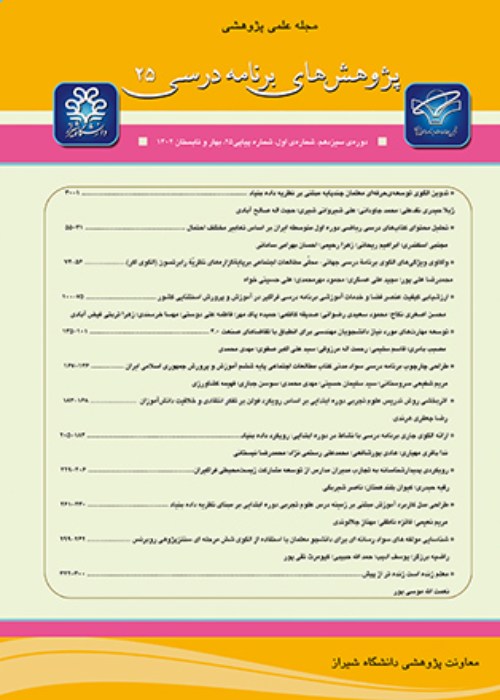Identifying Dimensions of Neglected Curriculum Based on the Difference Between Academic Curriculum and Intended Citizenship Curriculum in the Secondary School Social Studies Textbooks
Citizens, active participants in their social and cultural lives, successful and interested learners, and self-reliant and trustworthy individuals. Adolescents and young people need a right combination of intellectual and behavioral competencies and theoretical and practical knowledge to begin their independent lives, and the school must play its part in helping them fulfil this complex task and make the able to enter the social life. Considering the fact that our country's education system is of a centralized type, the role of the curriculum in it is twofold. Indeed, great care is required for the development of curriculums, and inclusion/exclusion of concepts in it/from it. Therefore, it is necessary for the researchers to carefully examine different dimensions of any curriculum in order to understand their strengths and weaknesses Social sciences subject areas are among important school subjects which are closely related to citizenship education and the high school social sciences textbook usually includes citizenship education programs. It is necessary to determine how the conceptof citizenship has been defined through the textbook and what dimensions of citizen education have been neglected in designing the textbooks. The neglected curriculum is that part of the curriculum which has been neglected and omitted and students will never have the opportunity to learn it.
What are the dimensions of the neglected curriculum based on the differences between the academic curriculum and the curriculum for teaching citizenship Individuals must learn how to participate effectively in the various aspects of life in their local, national, and global communities. Students, too, need to be educated in the areas of ethics, social development, and knowledge and understanding of the world in order for them to be able to participate in the decision making processes at home, school, and in the communityas an responsible citizen. Indeed, education need to be socially tailored to individuals’ circumstances. Today, citizenship education is not only a need, but also a priority. Citizenship education is important because individuals need to learn how to participate effectively in the community to improve various aspects of their lives. Educating decent and responsible citizens can be considered as a great help to individual and social development and lead to nature reserve. Citizenship trainings can be provided by the family, the school, the mass media, and social institutions but the primary responsibility rest with the education system. Education should help children and adolescents to become responsible concepts in the high school social studies textbooks?
Two qualitative methods, namely qualitative content analysis of the texts and qualitative case study, were used in this study in line with its main objectives.. Concerning content analysis of the texts, the the entire 7th,8th, and 9th grade social sciences textbooks were analyzed. The unit of analysis was a course, and the recoding unit was either a paragraph, an image, or a task. With regard to qualitative case study, participants included Social Studies and Sociology instructors at Tabriz and Urmia Universities. Here, the participants were interviewed and the obtained data were analyzed using thematic analysis. Then, data obtained from both qualitative research methods were subjected to the Max QDA Software and coding was performed. It was further revealed that the whole data set met the criteria of validity, reliability, accuracy and precision. Finally, the concepts which were obtained through interviewing with instructors were compare to the concepts within the textbooks.
The findings indicated that dimensions of economic education, namely making students familiar with new jobs in social networks and helping them to choose the right job, try seriously in financial fields, and be familiar with the concept of savings and dimensions of family education, namely making students familiar with spousal selection methods, dimensions of peace education, namely proposing conflict resolution, –developing resistance to oppression, and giving self-defense instruction, security, dimensions of political education, providing life skills training, making students familiar with gender roles familiarity, and logical thinking training were neglected by instructorsneglected for professors.
Based on the research, students suffer from a number of weaknesses in the use of some citizenship skills. It is necessary to thoroughly examine different dimensions of every curriculum in order to determine the strengths and weaknesses in it. Furthermore, the neglected curriculum should be paid attention to in every education in an attempt to train more responsible citizens.,. The results of this study revealed that neglected curriculum, as compared to hidden curriculum, has not been seriously considered in the education system. However, paying attention to the neglected curriculum can be of great importance who aims at proper training of decent citizens for the future. . , Considering most of curriculum developing models, information resources, and experts’ viewpoints, community needs and learners' needs should be considered in developing any balanced curriculum. Thus, it is recommended that curriculum planners, with a combination of perspectives (Professors, experts, community needs) and examine what students can learn in a citizenship education program through gaining the perspectives of university instructors and experts and doing community needs assessment. Neglected curriculum should also be considered in developing any curriculum based on citizenship education which tries to take appropriate, effective and practical measures for training responsible citizen for the future.
- حق عضویت دریافتی صرف حمایت از نشریات عضو و نگهداری، تکمیل و توسعه مگیران میشود.
- پرداخت حق اشتراک و دانلود مقالات اجازه بازنشر آن در سایر رسانههای چاپی و دیجیتال را به کاربر نمیدهد.



